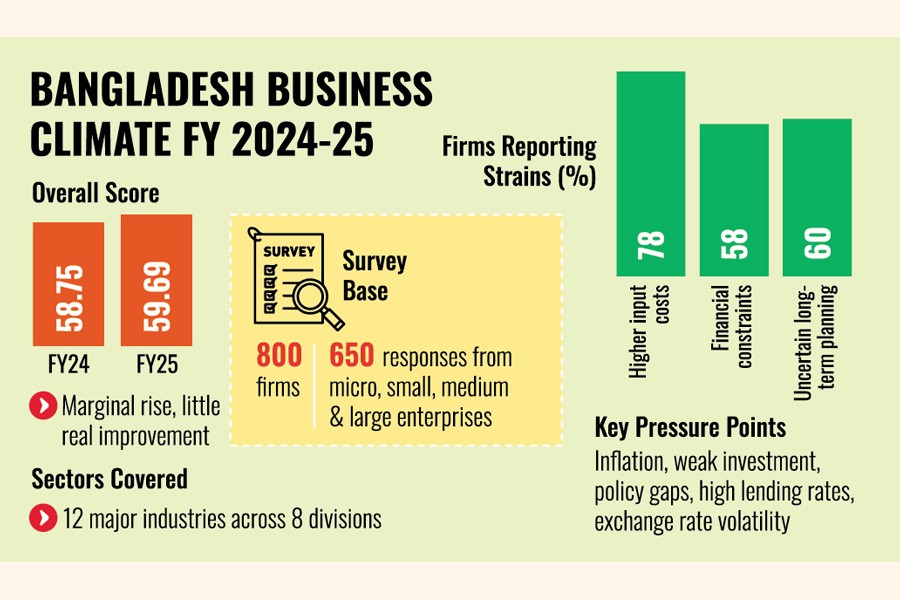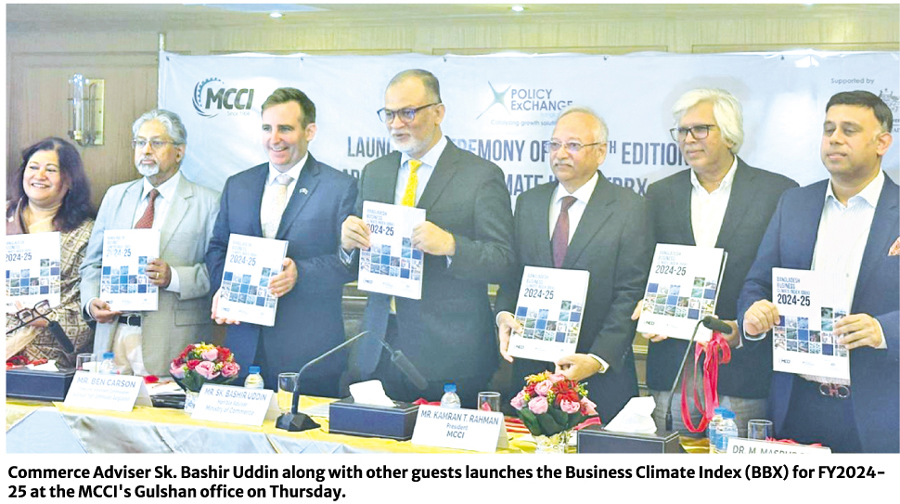
Published :
Updated :

Bangladesh's business environment has shown little sign of progress over the past year, with several key areas even deteriorating, according to the latest Business Climate Index (BBX) for FY2024-25 released on Thursday.
The index highlights persistent structural challenges, from access to regulatory information and infrastructure to labour regulation and trade facilitation, that continue to hinder private sector growth.
Although the overall BBX score edged up slightly to 59.69 from 58.75 a year earlier, the marginal improvement failed to deliver any tangible change on the ground.
The Metropolitan Chamber of Commerce and Industry, Dhaka (MCCI) and Policy Exchange Bangladesh (PEB) conducted surveys to prepare the BBX, with support from Australia's Department of Foreign Affairs and Trade (DFAT).

Economists and business leaders say the private sector remains weighed down by inflation, investment uncertainty, and policy inconsistencies, calling for urgent reforms to revitalise confidence and competitiveness.
The study attributes the stagnation to political instability, geopolitical uncertainty, rising production costs, investment hesitation, high inflation, elevated lending rates, and exchange rate volatility.
Scores had earlier remained above 61 points for two consecutive years before dropping sharply in FY2023-24.
The survey, now in its fourth edition, covered 800 businesses, including micro, small, medium, and large enterprises, across eight divisions, of which 650 responded.
It assessed 11 key pillars: Starting a business, access to land, availability of regulatory information, business infrastructure, labour regulation, dispute resolution, trade facilitation, paying taxes, technology adoption, access to finance, and environmental regulations and standards.
At the launch event held at MCCI's Gulshan office on Thursday, Commerce Adviser Sk. Bashir Uddin attended as chief guest.
He said high bank interest rates remain one of the major barriers to doing business in Bangladesh, and expressed hope that lending rates are likely to decline early next year, easing pressure on the private sector.
The adviser noted that businesses frequently raise concerns over tax audits conducted by the National Board of Revenue (NBR), which, he said, reflects a reluctance among some firms to maintain proper compliance.
"I think the audit itself is not the problem; the way it is conducted is the main issue," he remarked, urging businesses to strengthen their commitment to compliance and transparency.
Mr Bashir also identified corruption as a major impediment to business operations. "Corruption exists everywhere in the world. We may not be able to eliminate it completely, but we can make it much harder through strong monitoring and institutional independence," he said.
Presenting the report, Dr M. Masrur Reaz, Founder Chairman and CEO of Policy Exchange Bangladesh, said the findings show that "immediate and targeted reforms are critical to improving the country's business climate."
He noted that Dhaka and Chattogram, which together account for 58 per cent of national business activity, have shown 'no improvement' in recent years.
Starting a new business remains a major challenge in both cities, while Sylhet emerged as the top performer in four of the 11 pillars, and Barishal led in three.
Due to inflation, financial constraints and policy uncertainty, 78 per cent of firms reported higher input costs - particularly in the RMG, pharmaceuticals, and wholesale trade sectors.
Around 58 per cent of businesses cited financial difficulties, while 60 per cent said they struggled with long-term planning amid monetary tightening.
"The private sector continues to face multiple challenges, but officials acknowledge the need for urgent reforms," Dr Reaz added. "The BBX will continue to provide data-driven insights to help policymakers identify critical areas for improvement."
JETRO Country Representative Kazuaki Kataoka, addressing the event as guest of honour, noted that while BIDA is working hard to facilitate business, "there remains a gap between policy and implementation that needs to be reduced."
He added that Japanese investors face regulatory barriers because many policies are still written primarily in Bangla.
Ben Carson, Australian Trade and Investment Commissioner at Austrade, also spoke as guest of honour, while Anwar-ul Alam Chowdhury (Parvez), President of the Bangladesh Chamber of Industries (BCI), and Rupali Chowdhury, Managing Director of Berger Paints Bangladesh Ltd, participated in a panel discussion.
In his welcome remarks, MCCI President Kamran T. Rahman said the BBX reflects the realities of Bangladesh's economic landscape, helping policymakers, investors and development partners grasp both opportunities and bottlenecks.
He emphasised that reform efforts must translate into structural change. "Progress is needed in financial inclusion, digitalisation, infrastructure, skills development, and the management capacity of regulatory bodies," he said.
Anwar-ul Alam Chowdhury Parvez criticised bureaucratic inertia, noting that some officials are reluctant to act due to fears stemming from previous political transitions.
"Such attitudes are deeply concerning," he warned, calling for policy continuity to rebuild business confidence.
He said while the National Board of Revenue has suspended tax audits, some medium and large firms are still receiving letters from customs claiming old dues.
Rupali Chowdhury stressed that businesses must also maintain compliance. "The imposition of a minimum corporate tax came largely because many companies have been showing losses year after year," she said.
"Even if it's difficult, we must ensure compliance and trust each other. Automation and transparency are the way forward."
newsmanjasi@gmail.com


 For all latest news, follow The Financial Express Google News channel.
For all latest news, follow The Financial Express Google News channel.